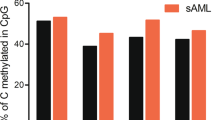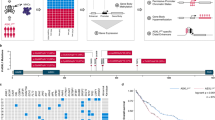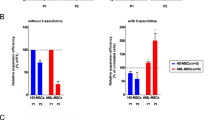Abstract
Epigenetic modifications have been found to play crucial roles in myelodysplastic neoplasm (MDS) progression. Previously, we investigated genome-wide DNA methylation alterations during MDS evolution to acute myeloid leukemia (AML) by next-generation sequencing (NGS). Herein, we further determined the role and clinical implications of an evident methylation change in CpG islands at the SLIT2 promoter identified by NGS. First, increased SLIT2 promoter methylation was validated in 11 paired MDS/AML patients during disease evolution. Additionally, SLIT2 promoter methylation was markedly increased in MDS/AML patients compared with controls and was correlated with poor clinical phenotype and outcome. Interestingly, SLIT2 expression was particularly upregulated in AML patients and was not correlated with SLIT2 promoter methylation. However, the SLIT2-embedded genes SLIT2-IT1 and miR-218 were downregulated in AML patients, which was negatively associated with SLIT2 promoter methylation and further validated by demethylation studies. Functionally, SLIT2-IT1/miR-218 overexpression exhibited antileukemic effects by affecting cell proliferation, apoptosis and colony formation in vitro and in vivo. Mechanistically, SLIT2-IT1 may function as a competing endogenous RNA by sponging miR-3156-3p to regulate BMF expression, whereas miR-218 may directly target HOXA1 in MDS progression. In summary, our findings demonstrate that SLIT2 promoter hypermethylation is associated with disease evolution in MDS and predicts poor prognoses in both MDS and AML. Epigenetic inactivation of SLIT2-IT1/miR-218 by SLIT2 promoter hypermethylation could be a promising therapeutic target in MDS.
This is a preview of subscription content, access via your institution
Access options
Subscribe to this journal
Receive 12 print issues and online access
$259.00 per year
only $21.58 per issue
Buy this article
- Purchase on Springer Link
- Instant access to full article PDF
Prices may be subject to local taxes which are calculated during checkout






Similar content being viewed by others
Data availability
The datasets used and/or analyzed during the current study are available from the corresponding author on reasonable request.
References
Cazzola M. Myelodysplastic syndromes. N. Engl J Med. 2020;383:1358–74.
Khoury JD, Solary E, Abla O, Akkari Y, Alaggio R, Apperley JF, et al. The 5th edition of the World Health Organization Classification of Haematolymphoid Tumours: Myeloid and Histiocytic/Dendritic Neoplasms. The 5th edition of the World Health Organization Classification of Haematolymphoid Tumours: Myeloid and Histiocytic/Dendritic Neoplasms. Leukemia. 2022;36:1703–19.
Goel H, Rahul E, Gupta I, Chopra A, Ranjan A, Gupta AK, et al. Molecular and genomic landscapes in secondary & therapy related acute myeloid leukemia. Am J Blood Res. 2021;11:472–97.
Martínez-Cuadrón D, Megías-Vericat JE, Serrano J, Martínez-Sánchez P, Rodríguez-Arbolí E, Gil C, et al. Treatment patterns and outcomes of 2310 patients with secondary acute myeloid leukemia: a PETHEMA registry study. Blood Adv. 2022;6:1278–95.
Palomo L, Meggendorfer M, Hutter S, Twardziok S, Ademà V, Fuhrmann I, et al. Molecular landscape and clonal architecture of adult myelodysplastic/myeloproliferative neoplasms. Blood. 2020;136:1851–62.
Garcia-Manero G, Chien KS, Montalban-Bravo G. Myelodysplastic syndromes: 2021 update on diagnosis, risk stratification and management. Am J Hematol. 2020;95:1399–420.
Menssen AJ, Walter MJ. Genetics of progression from MDS to secondary leukemia. Blood 2020;136:50–60.
Dan C, Chi J, Wang L. Molecular mechanisms of the progression of myelodysplastic syndrome to secondary acute myeloid leukaemia and implication for therapy. Ann Med. 2015;47:209–17.
Bravo GM, Lee E, Merchan B, Kantarjian HM, García-Manero G. Integrating genetics and epigenetics in myelodysplastic syndromes: advances in pathogenesis and disease evolution. Br J Haematol. 2014;166:646–59.
Heuser M, Yun H, Thol F. Epigenetics in myelodysplastic syndromes. Semin Cancer Biol. 2018;51:170–9.
Ye F, Li N. Role of p15(INK4B) methylation in patients with myelodysplastic syndromes: a systematic meta-analysis. Clin Lymphoma Myeloma Leuk. 2019;19:e259–e265.
Zhang TJ, Xu ZJ, Gu Y, Wen XM, Ma JC, Zhang W, et al. Identification and validation of prognosis-related DLX5 methylation as an epigenetic driver in myeloid neoplasms. Clin Transl Med. 2020;10:e29.
Zhou JD, Wang YX, Zhang TJ, Li XX, Gu Y, Zhang W, et al. Identification and validation of SRY-box containing gene family member SOX30 methylation as a prognostic and predictive biomarker in myeloid malignancies. Clin Epigenetics. 2018;10:92.
Zhou JD, Zhang TJ, Li XX, Ma JC, Guo H, Wen XM, et al. Epigenetic dysregulation of ID4 predicts disease progression and treatment outcome in myeloid malignancies. J Cell Mol Med. 2017;21:1468–81.
Zhou JD, Lin J, Zhang TJ, Ma JC, Yang L, Wen XM, et al. GPX3 methylation in bone marrow predicts adverse prognosis and leukemia transformation in myelodysplastic syndrome. Cancer Med. 2017;6:267–74.
Zhou JD, Zhang TJ, Xu ZJ, Deng ZQ, Gu Y, Ma JC, et al. Genome-wide methylation sequencing identifies progression-related epigenetic drivers in myelodysplastic syndromes. Cell Death Dis. 2020;11:997.
Blockus H, Chédotal A. Slit-Robo signaling. Development. 2016;143:3037–44.
Tong M, Jun T, Nie Y, Hao J, Fan D. The role of the slit/robo signaling pathway. J Cancer. 2019;10:2694–705.
Gara RK, Kumari S, Ganju A, Yallapu MM, Jaggi M, Chauhan SC. Slit/Robo pathway: a promising therapeutic target for cancer. Drug Disco Today. 2015;20:156–64.
Jiang Z, Liang G, Xiao Y, Qin T, Chen X, Wu E, et al. Targeting the SLIT/ROBO pathway in tumor progression: molecular mechanisms and therapeutic perspectives. Ther Adv Med Oncol. 2019;11:1758835919855238.
Xu F, Wu LY, Chang CK, He Q, Zhang Z, Liu L, et al. Whole-exome and targeted sequencing identify ROBO1 and ROBO2 mutations as progression-related drivers in myelodysplastic syndromes. Nat Commun. 2015;6:8806.
Yang D, Zhang T, Wang Y, Yao D, Yang L, Zhou J, et al. Decreased miR-218 expression predicts unfavorable prognosis in de novo acute myeloid leukemia. Int J Clin Exp Pathol. 2016;9:8318–26.
Papaemmanuil E, Gerstung M, Malcovati L, Tauro S, Gundem G, Van Loo P, et al. Clinical and biological implications of driver mutations in myelodysplastic syndromes. Blood. 2013;122:3616–27.
Jiang Y, Dunbar A, Gondek LP, Mohan S, Rataul M, O’Keefe C, et al. Aberrant DNA methylation is a dominant mechanism in MDS progression to AML. Blood 2009;113:1315–25.
Narayan G, Goparaju C, Arias-Pulido H, Kaufmann AM, Schneider A, Dürst M, et al. Promoter hypermethylation-mediated inactivation of multiple Slit-Robo pathway genes in cervical cancer progression. Mol Cancer. 2006;5:16.
Tseng RC, Lee SH, Hsu HS, Chen BH, Tsai WC, Tzao C, et al. SLIT2 attenuation during lung cancer progression deregulates beta-catenin and E-cadherin and associates with poor prognosis. Cancer Res. 2010;70:543–51.
Mohamed G, Talima S, Li L, Wei W, Rudzki Z, Allam RM, et al. Low expression and promoter hypermethylation of the tumour suppressor SLIT2, are associated with adverse patient outcomes in diffuse large b cell lymphoma. Pathol Oncol Res. 2019;25:1223–31.
Mitra S, Mazumder-Indra D, Mondal RK, Basu PS, Roy A, Roychoudhury S, et al. Inactivation of SLIT2-ROBO1/2 pathway in premalignant lesions of uterine cervix: clinical and prognostic significances. PLoS One. 2012;7:e38342.
Tseng RC, Chang JM, Chen JH, Huang WR, Tang YA, Kuo IY, et al. Deregulation of SLIT2-mediated Cdc42 activity is associated with esophageal cancer metastasis and poor prognosis. J Thorac Oncol. 2015;10:189–98.
Lin CJ, Huang WR, Wu CZ, Tseng RC. Changes in SLIT2 expression are associated with the migration of human ovarian clear cell carcinoma cells. Oncol Lett. 2021;22:551.
Huang Y, Xie Y, Abel PW, Wei P, Plowman J, Toews ML, et al. TGF-beta1-induced miR-424 promotes pulmonary myofibroblast differentiation by targeting Slit2 protein expression. Biochem Pharm. 2020;180:114172.
Dong Y, Fan G, Li Y, Zhou Q. TUG1 represses apoptosis, autophagy, and inflammatory response by regulating miR-27a-3p/SLIT2 in lipopolysaccharide-treated vascular endothelial cells. J Surg Res. 2020;256:345–54.
Shen X, Li L, He Y, Lv X, Ma J. Raddeanin A inhibits proliferation, invasion, migration and promotes apoptosis of cervical cancer cells via regulating miR-224-3p/Slit2/Robo1 signaling pathway. Aging. 2021;13:7166–79.
Weinhäuser I, Pereira-Martins DA, Ortiz C, Silveira DR, Simões LAA, Bianco TM, et al. Reduced SLIT2 is associated with increased cell proliferation and arsenic trioxide resistance in acute promyelocytic leukemia. Cancers. 2020;12:3134.
Gołos A, Jesionek-Kupnicka D, Gil L, Braun M, Komarnicki M, Robak T, et al. The expression of the SLIT-ROBO family in adult patients with acute myeloid leukemia. Arch Immunol Ther Exp. 2019;67:109–23.
Tavora B, Mederer T, Wessel KJ, Ruffing S, Sadjadi M, Missmahl M, et al. Tumoural activation of TLR3-SLIT2 axis in endothelium drives metastasis. Nature 2020;586:299–304.
Lu YF, Zhang L, Waye MM, Fu WM, Zhang JF. MiR-218 mediates tumorigenesis and metastasis: Perspectives and implications. Exp Cell Res. 2015;334:173–82.
Díaz-Beyá M, Navarro A, Ferrer G, Díaz T, Gel B, Camós M, et al. Acute myeloid leukemia with translocation (8;16)(p11;p13) and MYST3-CREBBP rearrangement harbors a distinctive microRNA signature targeting RET proto-oncogene. Leukemia. 2013;27:595–603.
Wang Y, Sun HH, Sui MH, Ma JJ. miR-218 inhibits acute promyelocytic leukemia cell growth by targeting BMI-1. Oncol Lett. 2017;14:8078–83.
Li Y, Liu S, Sun H, Yang Y, Qi H, Ding N, et al. MiR-218 inhibits erythroid differentiation and alters iron metabolism by targeting ALAS2 in K562 cells. Int J Mol Sci. 2015;16:28156–68.
Chen LL. Linking long noncoding RNA localization and function. Trends Biochem Sci. 2016;41:761–72.
Schmitt AM, Chang HY. Long noncoding RNAs in cancer pathways. Cancer Cell. 2016;29:452–63.
Bartel DP. MicroRNAs: genomics, biogenesis, mechanism, and function. Cell 2004;116:281–97.
Handschuh L, Wojciechowski P, Kazmierczak M, Lewandowski K. Transcript-level dysregulation of BCL2 family genes in acute myeloblastic leukemia. Cancers 2021;13:3175.
Chen SL, Qin ZY, Hu F, Wang Y, Dai YJ, Liang Y. The role of the HOXA gene family in acute myeloid leukemia. Genes. 2019;10:621.
Funding
The work was supported by National Natural Science Foundation of China (81900166, 81900163, 81970118), Zhenjiang Clinical Research Center of Hematology (SS2018009), Social Development Foundation of Zhenjiang (SH2020055, SH2021052), Medical Field of Zhenjiang “Jin Shan Ying Cai” Project, Medical Education Collaborative Innovation Fund of Jiangsu University (JDY2022011), Scientific Research Foundation of Affiliated People’s Hospital of Jiangsu University for PhD (KFB202002, KFB202202).
Author information
Authors and Affiliations
Contributions
JQ and J-DZ conceived and designed the experiments; T-JZ and X-MW performed the experiments; Z-JX analyzed the data and provided bioinformatics analysis; YG and QY collected the clinical data; J-CM and JL provided the technical and financial supports; T-JZ wrote the manuscript; J-DZ revised the manuscript; All authors read and approved the final manuscript.
Corresponding authors
Ethics declarations
Competing interests
The authors declare no competing interests.
Ethical approval and consent to participate
The present study approved by the Ethics Committee of the Affiliated People’s Hospital of Jiangsu University. Written informed consents were obtained from all enrolled individuals prior to their participation.
Additional information
Publisher’s note Springer Nature remains neutral with regard to jurisdictional claims in published maps and institutional affiliations.
Supplementary information
Rights and permissions
Springer Nature or its licensor holds exclusive rights to this article under a publishing agreement with the author(s) or other rightsholder(s); author self-archiving of the accepted manuscript version of this article is solely governed by the terms of such publishing agreement and applicable law.
About this article
Cite this article
Zhang, Tj., Xu, Zj., Wen, Xm. et al. SLIT2 promoter hypermethylation-mediated SLIT2-IT1/miR-218 repression drives leukemogenesis and predicts adverse prognosis in myelodysplastic neoplasm. Leukemia 36, 2488–2498 (2022). https://doi.org/10.1038/s41375-022-01659-1
Received:
Revised:
Accepted:
Published:
Issue Date:
DOI: https://doi.org/10.1038/s41375-022-01659-1



